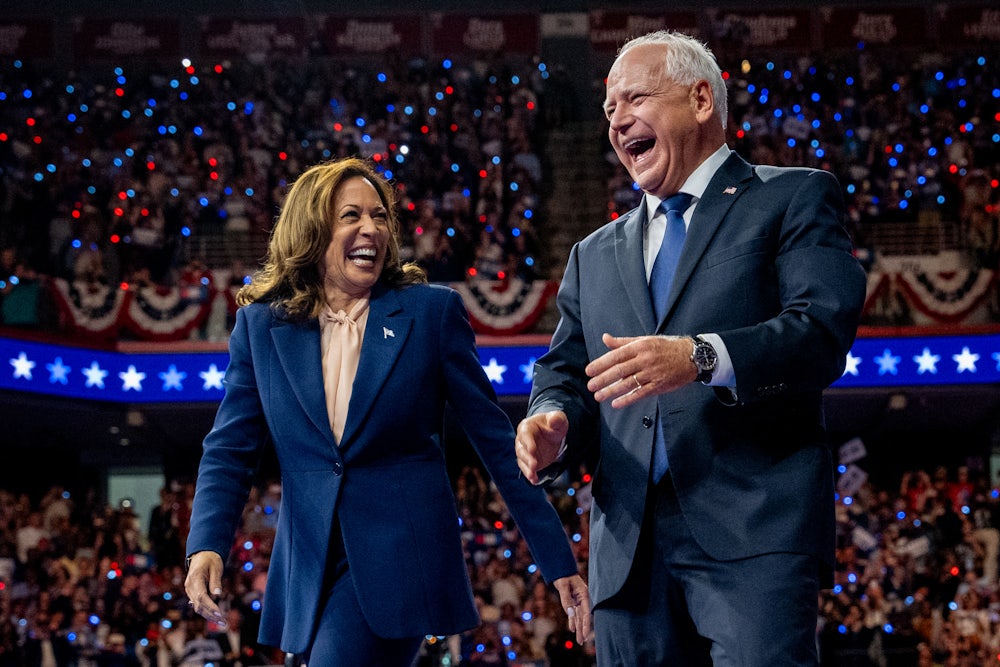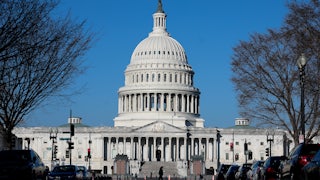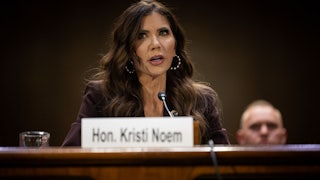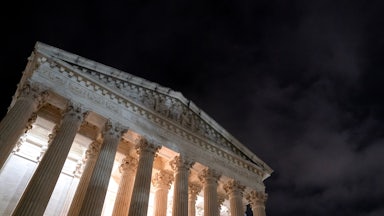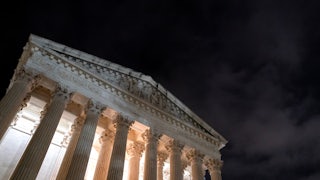In early July, as a growing chorus of Democrats called on President Biden to end his reelection campaign, I warned in these pages that “panicky pundits and skittish elected officials have failed to consider the downside of success. It’s considerable: It would be a nightmare worse than the bad political dream they are having now.” The process of selecting a new nominee could leave the party “deeply divided,” I added: “Democrats would be poised for an August convention that would make their infamous 1968 iteration look like a White House picnic.”
I have never been happier to be so wrong.
Even those who pushed for Biden to drop out—whether as early as last fall or after his disastrous debate with Trump in June—could not have predicted the week we’re witnessing in Chicago. A mere month ago, the party was indeed divided (over the question of Biden’s campaign) and united only in its fear of likely defeat to Trump. Today, Democrats look uncontrollably happy—and yes, uncharacteristically unified. There’s been no infighting to speak of, no generational feuds over party ideology, no bloody floor fight. What could have been a contested convention—whether figuratively or literally—has instead been a pure celebration of Vice President Kamala Harris.
Just watch the highlights from Tuesday night’s roll call, where every state delegation officially nominated Harris for president. Democrats whooped it up, dancing to home state walk-up songs like Atlanta native Lil Jon’s “Turn Down for What”—a stark contrast with the Republican National Convention, where Senate Minority Leader Mitch McConnell was booed during the roll call. Harris, not coincidentally, was across the border in Milwaukee, speaking to a packed stadium where the RNC had held its convention in July.
Or consider how the third night unfolded on Wednesday. Emboldened and giddy at the increasing prospect of a Trump defeat, speakers taunted the former president in between crowd-pleasing appearances by Oprah Winfrey and singer John Legend. “Don’t count the lies,” former President Bill Clinton said of Trump. “Count the ‘I’s.” Transportation Secretary Pete Buttigieg, greeted like a future candidate for the job Harris is seeking, marveled that “Trump rants about law and order—as if he wasn’t a convicted criminal running against a prosecutor.”
In a summer when so much could have gone wrong for Democrats—who are prone to self-harming political behavior—pretty much everything has gone right for the party and for Harris. I had warned that Biden stepping down “would provoke an open fight among different Democratic factions” over who should succeed him, and that even if Harris becomes the obvious choice, “don’t expect a sigh of relief and a seamless move to the general election campaign against Trump.”
What happened was something out of a political strategist’s fairy tale: Biden endorsed Harris right away, and Democratic leaders followed suit. Rank-and-file Democrats also rallied around her, contributing more than $300 million in July (and a stunning half billion dollars in her first full month, her campaign said this week). National and battle-state polling shifted in her direction, with a prominent forecaster moving North Carolina to “toss-up” status. While the right wing branded Harris a “DEI hire,” the Democrats have gleefully shoved all kinds of diversity down the opposing party’s throats. The myriad Zoom fundraisers were a cheeky salute to identity politics: White Dudes for Harris, Cat Ladies for Harris, Dead Heads for Harris—and, just to twist the knife, Republicans for Harris. Even the Gaza protests that Democrats feared would turn the convention into 1968 redux have been relatively tame.
“Things are feeling in array,” Eric Schultz, a Democratic consultant and Obama White House veteran, told me. “We have plenty of work to do ahead because this race is very close, but it helps a lot that we are all rowing in the same direction.”
Democrats are notorious infighters. The left wing openly challenges the establishment wing, sometimes to the detriment of the overall mission (such as holding up a bipartisan infrastructure bill in hopes of getting a more generous social spending and climate change package—slowing Biden’s legislative momentum and ending up with a pared-down spending bill). And the establishment wing rebuffs the left wing, sometimes to the detriment of sound politics and policy (such as refusing to weaken the filibuster for voting rights, D.C. statehood, or Supreme Court reform). Even the Democrats’ presidential nominating process encourages brutal fights. Unlike Republicans’ winner-take-all system for most primaries, Democrats award their delegates proportionally. In 2008, Republicans settled on their choice after Super Tuesday; Barack Obama and Hillary Clinton battled it out for the Democratic nomination until June of that year.
Biden’s dramatic departure from the race threatened to fuel more division and intraparty bickering. But facing the specter of another Trump presidency, Democrats got their act together fast. And the unity went beyond just a commitment to Harris. At the convention this week, the entire party has turned its ideological and generational diversity into a strength.
New York Representative Alexandria Ocasio-Cortez—who in 2020 lamented to New York magazine that “in any other country, Joe Biden and I would not be in the same party, but in America, we are”—delivered a barnstormer of a speech Monday in which she praised Biden, took down “two-bit union buster” Trump, and lauded Harris. Soon afterward, Ocasio-Cortez was followed by Hillary Clinton—more than twice the Squad leader’s age and from the centrist wing of the party—delivering the same message.
“The fact that we went from AOC to HRC so seamlessly—both got huge ovations—suggests that we have set aside our differences,” Matt Bennett, executive vice president of the center-left group Third Way, told me. “We will pick them up again, if and when we win this thing. But Trump is the unifier for Democrats.”
Such was the unity on Tuesday night that Vermont Senator Bernie Sanders lambasted corporate greed and declared that billionaires in both parties should not be able to buy elections—and was immediately followed by Illinois Governor J.B. Pritzker, who noted his own status as an “actual billionaire” as he derided Trump as being “rich in only one thing—stupidity.”
And on Wednesday night, Minnesota Governor Tim Walz, Harris’s vice presidential nominee, wrapped up the day’s speeches with a pep talk out of a Hollywood screenplay about a struggling sports team, made up of a quirky set of widely different personalities and strengths, which somehow managed to score the big championship win. “Leaders don’t spend all day insulting people and blaming others,” he said, as people hoisted “Coach Walz” signs in the audience. His calls for education and health care as basic rights, for government to stay out of people’s bedrooms and doctors’ offices, and for children to be free from hunger and school shootings, might have sounded like a left-wing screed from another candidate. But as a guy who looked like he was pulled out of central casting for the role of sage, Midwestern schoolteacher, Walz welded the competing elements of his party into a united force.
“The progressives have been accusing Democrats of acting too much like Republicans,” veteran New York political adviser Bill Cunningham said to me, referring to criticisms that Democrats have become too hawkish on issues like immigration. But when it comes to party unity, “Maybe, in this case, it’s not such a bad thing,”
The smooth transition from Biden to Harris underscores the Democrats’ new discipline. It happened because Harris never joined the chorus of Democrats needling Biden to get out of the race, but quickly got into top-of-the-ticket mode when Biden dropped out and endorsed her. And she’s proving to be a far stronger candidate than she was during the 2020 race, when her quest for the nomination fizzled quickly. Her role as vice president—where the amount of responsibility far exceeds the public’s interest in it—allowed her to hone her skills without being under the microscope. She got minimal press coverage when she visited college campuses, represented the United States at the Munich Security Conferences, and served as the point person for reproductive rights, but that experience has made her a more confident campaigner now that the spotlight is on her.
And far from hindering her, the abbreviated campaign—a three-month sprint to November—has worked (so far) to Harris’s advantage. Every event, from her massive rallies to announcing Walz as her running mate to this week’s convention, have all rewarded her with bursts of Democratic enthusiasm and fundraising. The September debate against Trump may do the same. And it leaves little time for Democrats to engage in the usual hand-wringing.
“We cannot be our own worst enemies,” former First Lady Michelle Obama told a raucous crowd Tuesday night, in perhaps the best speech of the convention thus far. This year, Democrats may well have learned that lesson. Republicans fall in line, and Democrats fall in love, GOP strategist Karl Rove noted on Fox News, repeating an old political axiom. This year, he said, Democrats are “doing both.”
